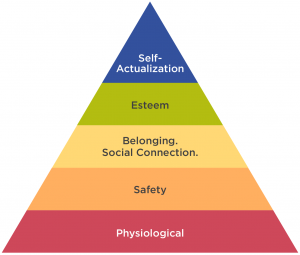A Question of Culture
12th July, 2023
The word ‘culture’ is not one that the Good Business Charter has tended to reference, instead developing a focus on EMBEDDING the 10 components of the GBC. However, embedding a framework like the GBC does not flow from outside. Championing people both within and external to your organsiation flows primarily from the heart – from the values held by the organisation as a whole.
These are not some kind of values concocted by a distant senior leadership team, perhaps engaging some external advice, and imposed on the rest. That ends up being simply a piece of paper with some words on it, and it doesn’t matter in how many places you put up posters with those words. They won’t become a reality if they are not embedded into the culture of the organisation.
So too, there is a stark difference between doing an employee survey simply because you think you ought and using the survey tool as a mechanism to understand more about what makes your workforce tick and how you can serve them better. The former tends to lead to a load of results that are skimmed by the Human Resources team and shelved as a general idea of how the organisation’s employees are doing. The latter is likely to yield results already expected because the organisation is already engaged with colleagues and working on their key concerns. It provides additional information that can be reported on, up to Board level and with colleagues as part of plans to address key issues.
An organisation looking for some kind of list of how to make their staff happier is simply starting from the wrong place. A stand-alone aim such as increasing worker satisfaction, reducing absenteeism or retail shrinkage are recognisable KPIs but making them the aim misses the point as we were reminded today in a panel with expert speakers from CIPD and GBC accredited organisations Aviva and Capita.
People are not computers to be reprogrammed, leading to direct improvements on these metrics. They are human beings who above all long to be valued and understood. The challenges they face in life are largely the same. Using Maslow’s hierarchy of needs as a guide helps show why fair wages and secure work matter so they can pay their rent and purchase food. That is the basic first step in the pyramid. Beyond that they need to feel safe, then a sense of belonging, self-esteem and ultimately the ability to flourish in self-actualisation.

Line managers therefore have a mighty opportunity in the workplace to meet people’s needs in a powerful way. A company where everyone feels properly rewarded and valued with the right level and amount of work to occupy them will also be a happy place where productivity naturally flows as will great customer service.
That’s not to say it is easy. To fully care for and champion people, to show a genuine interest in them and want the best for them, requires a culture that cares for and values people. Otherwise, if you are the lone line manager seeking to champion your team in an environment where the focus is on outputs rather than wellbeing and inclusion, you will find yourself quickly frustrated – and in turn not see your own needs met. Such managers are likely to move to an organisation better aligned to their values.
A culture of caring for people starts at the top, and at the bottom, and flows up and down through meaningful engagement whatever the actual structures to do that might be. The challenge isn’t to find the perfect forum mechanism or wellbeing software – it is to get the culture right.
That’s what Julian Richer did after he had read ‘In Search of Excellence’ in the early years of founding Richer Sounds. He put people first and all his decisions evidenced that. He is well known for the mantra ‘it’s all about the people’ and his actions match those words. ‘It’s only about the people’ I was told recently by a Head of People – with organisations made up of people and only people, it is of course a fair point!
How do organisations lose sight of this reality? I suspect the small business owner, connected to the members of their team, pulling together towards a common goal, is acutely aware of their dependence on their colleagues. When this gets siphoned off to some HR department, the red flags are there. If organisations only exist because of the people working within them, why would we sideline the department that looks after them and receives their concerns?
The Good Business Charter accredited organisations that are most effective at ensuring they champion people are those that have their Head of People involved in the top tier of senior leadership – or ensure their CEO has a people-focused culture at the forefront of their mind. Some benefit from both – and are stronger as a result.
That’s not to say they are perfect, but when they try something and get it wrong, they are much more likely to have ways for their workers to let them know that, and be prepared to listen to them and address the issues. That is true employee representation.
And of course, as you seek to get these things right, you will find those KPIs mentioned above naturally improving – but as a byproduct of your care for people, not the target. To shortcut putting people first is short-sighted and will leave you behind in an age where this matters more than ever and the workforce is informed and seeking out the organisations where they believe they will truly flourish. After all aren’t we all?
If people are flourishing,they are also less likely to plumb for early retirement, or leave for a new career. There is a people and skills shortage but the organisations best known for their championing of people are also the ones with less vacancies.

